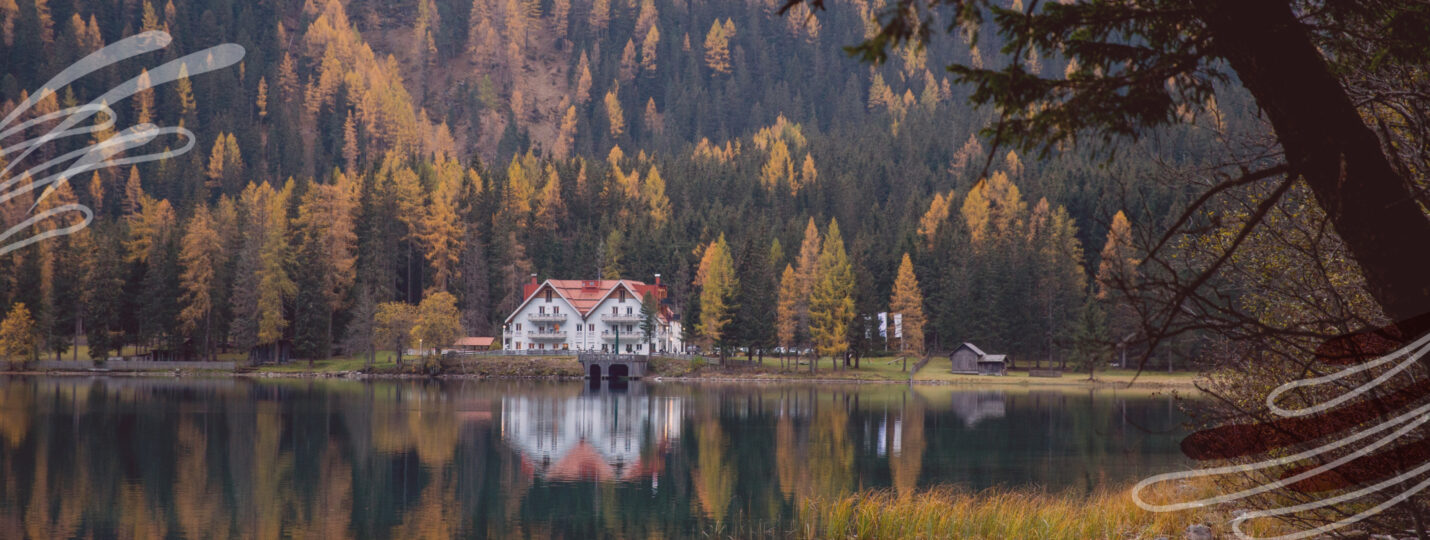
Safest Countries in the World: Updated in July 2024
Have recent events got you questioning your safety and future? You’re not alone. With the war in Europe, the pandemic, and increasing violence, many are searching for a safer and more stable home. It’s time to explore the top countries that offer the peace of mind you crave.
Luckily, the Institute for Economics & Peace (IEP) has just released its updated Global Peace Index, ranking 163 independent states and territories based on their level of peacefulness. Once again, European countries dominate the top spots, with Iceland maintaining its position as the most peaceful country in the world.
Take a detailed look at the top 10 countries, and make sure to check out the end of the article to see a list of the top 20 safest countries based on the results covering until July 2023.
What Makes a Country Safe?
In a safe country, people and tourists feel comfortable and protected from various risks. Those can be political stability, crime rate, economic success, social harmony, and good government, all contributing to a country’s safety.
Here are some of the significant factors that contribute to the safety of a country:
- Political stability: We can start talking about political stability if a country has a stable administration and a strong democratic system. It’s more likely to be secure than one that has seen political volatility and instability.
- Low crime rate: You may be wondering what can be a sign of a safe country. You will notice a low incidence of crime, particularly violent crime. So you’ll find a strong sign showing you the safety of a country.
- Economic prosperity: Countries with strong economies and low unemployment rates are generally safer since individuals are less inclined to participate in criminal activities when they have access to employment and resources.
- Social harmony: Harmony is important as well. When people are surrounded by diverse ethnic and religious groups, they realize living in harmony in a more secure community. It means that there’ll be less prejudice and intolerance critical to establishing societal peace.
- Effective governance: This type of government listens to its citizens’ demands has effective policies in place to solve societal concerns is more likely to foster safety and security.
- Natural disaster preparedness: Countries that have well-developed emergency management systems and disaster preparedness programs are more likely to deal with crises and limit damage.
- Responsive and effective law enforcement: An effective law enforcement system is required to ensure public safety. Such a system must include responsive police forces that are prepared to prevent and respond to crime, as well as a strong court system that ensures justice is delivered. Law enforcement officers must be well-trained, equipped, and accountable for their actions.
- Close-knit community: A strong feeling of community and social connectivity can help to make the country safer. In a close-knit community, neighbors look out for one another, which might discourage criminal activities. Strong communal relationships can also promote social cohesiveness and resilience during times of distress.
- Low level of militarization: The amount of militarization inside a country is also taken into account when judging safety. High levels of military spending, weapons exports, and engagement in armed wars might indicate instability and heighten the danger of violence. In contrast, countries with lower degrees of militarization may be regarded as safer and more peaceful.
Top 10 Safest Countries in the World
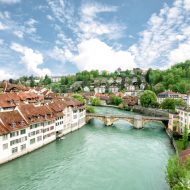
 10. Switzerland
10. Switzerland
Switzerland is a country that has a picture of neutrality and serenity. It is the 10th safest country in the world according to the 2024 Global Peace Index. Low crime rates and long history of being out of international conflicts contribute to the peacefulness in Switzerland for residents and visitors of the country.
Historically speaking, Switzerland is a country that chose to stay neutral in world wars. So, the neutrality eventually is used to promote world peace and security.
In addition, low crime rates and rare violent crime are effective reasons for Switzerland to be one of the safest countries in the world. Effective law enforcement measures implemented by the Swiss government can be considered as another factor of safety as well.

 9. Japan
9. Japan
According to the Global Peace Index, Japan ranks as the 9th safest country in the world. It is considered one of the safest countries in the world, with a very low crime rate.
Why? For starters, the country has strict gun control laws, making it difficult for criminals to obtain firearms. Additionally, the Japanese government has invested heavily in security measures such as CCTV cameras and metal detectors, which help to deter crime. Foreigners moving to Japan may expect a safe environment in general.
But it's not just the laws and technology that make Japan safe. Japanese culture places great importance on having respect for others and a commitment to peace. These values are ingrained in the society and contribute to the country's overall sense of safety and order.
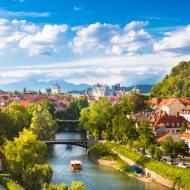
 8. Slovenia
8. Slovenia
Slovenia is a small country with a lot to offer. Situated in Central Europe, it has a population of just over 2 million people and a short coastline along the Adriatic Sea. Despite its small size, Slovenia is ranked 8th on the Global Peace Index in 2023.
The low crime rates and the stable political environment are significant factors contributing to Slovenia's safety.
Slovenia's location is also advantageous, with its neighbors being Austria, Hungary, Croatia, and Italy. This positioning means that it's away from any areas of conflict or unrest.
In Slovenia, you will find plenty of things to see and do, with the country's charming capital, Ljubljana, being a must-visit destination.
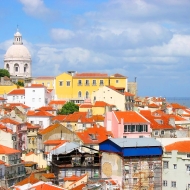
 7. Portugal
7. Portugal
Portugal isn't just a picturesque country with a great climate and laid-back atmosphere. It's also one of the safest countries for travel in the world. According to the Global Peace Index, Portugal ranks 7th, and it's the 3th safest among the EU countries.
Why is it safe? Well, it has a low level of income inequality. Portugal's wealthiest households earn just 7.5 times more than the poorest households, compared to nearly 12 times in the United States.
It also benefits from a strong rule of law, which helps to protect property rights and minimize government corruption.
The country has a long history of peaceful relations with its neighbors and hasn't been involved in a major war for over two centuries.
It's also home to popular residency programs like the Portugal Golden Visa and D7 Visa. Check out our article on Being an Expat in Portugal.

 6. Singapore
6. Singapore
This vibrant city-state is renowned for its political stability, high standard of living, and low crime rates. In fact, Singapore is the safest country in Asia and the 6th safest country in the world.
For starters, the city has a zero-tolerance approach to crime. Law enforcement works hard to keep the streets safe and ensures that criminals are dealt with harshly.
But it's not just the laws that make Singapore safe – it's the culture too. Singaporeans have a strong culture of respect for authority and the law, which helps to promote safety and security.
It is a clean and well-organized country. The city's residents take pride in maintaining its cleanliness and orderliness. This helps to create an overall sense of safety and security.
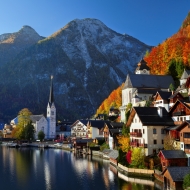
 5. Austria
5. Austria
Austria is the fifth safest country in the world. Its impressive safety ranking is due to a combination of factors, including a low crime rate and a strong economy. The country has few violent crimes, and property crimes are relatively rare, making it an ideal place to live, work, and raise a family.
A key reason for the low crime rate is the strong economy. People are less likely to turn to criminal activity when they have a stable income.
The Austrian government and political system is known for its efficiency and lack of corruption.
Whether you're exploring the stunning Alpine scenery or indulging in Vienna's famous Sachertorte, you can relax knowing that you're in one of the safest countries in the world.
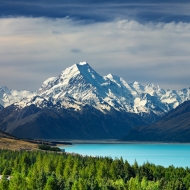
 4. New Zealand
4. New Zealand
New Zealand, the land of the long white cloud, is not only famous for its stunning landscapes and friendly locals, but it's also the second safest country globally.
With a small population and a low crime rate, it's a safer place to live than many other countries.
Being an isolated country in the Pacific Ocean with a stable government also helps, making it less susceptible to external threats.
While New Zealand is prone to natural disasters such as earthquakes and volcanic eruptions, the country has strict building codes to help protect against earthquake damage.
Whether you're exploring the stunning Milford Sound or hiking in the majestic mountains of the South Island, you can enjoy all that New Zealand has to offer while feeling secure and safe.
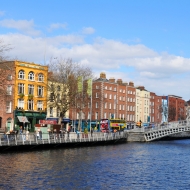
 3. Ireland
3. Ireland
Ireland brings to mind images of rolling green hills, lively pubs, and friendly locals may come to mind. Well, it also ranks as the third safest country globally.
In 2018, there were only 33 murders in the entire country, significantly below the global average. This can be attributed to the country's tight gun laws and its well-funded police force.
Ireland is largely free from terrorism. Despite its turbulent past, it had no major incidents in recent years, and its policy of military neutrality means no involvement in any active conflicts.
From the stunning Cliffs of Moher to the lively Temple Bar district in Dublin, there's no shortage of things to see and do in peace.
Got Irish roots? Check out Irish citizenship by descent.
And if you're getting serious and considering a move, make sure to check our guide on living in Ireland.
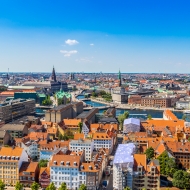
 2. Denmark
2. Denmark
Denmark, the country that gave us Lego, pastries, and the concept of "hygge," is not just a fun and cozy place to visit. It's also the fourth safest country globally.
Only 55 homicides were recorded in the country in 2022, which is remarkably low.
The country's strong economy and welfare system also play a role in its safety. By reducing inequality and social unrest, people are less likely to turn to crime or violence.
Denmark has a relatively homogeneous population. Being a small country, it's easier to maintain law and order, and social cohesion is high.
Whether you're strolling through Copenhagen's cobblestone streets or biking along the coast, you can rest assured that Denmark has your back.
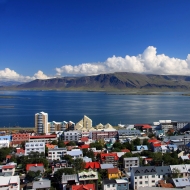
 1. Iceland
1. Iceland
Iceland, the land of fire and ice, is also the safest country in the world according to the Global Peace Index.
With a low homicide rate, low level of violent crime, and limited access to small arms, Iceland is truly a peaceful country for its residents and visitors.
Iceland's political stability, low number of refugees, and internally displaced persons also contribute to its safety.
So whether you're looking to soak in a geothermal pool or explore the breathtaking landscapes of Iceland, you can do so with the confidence that you're in the safest country on earth.
Safety Tips for Traveling Abroad
- 🌎 Research your destination, learn local customs and laws, and follow them.
- 📞 Share your itinerary with a friend, and keep in touch.
- 💳 Keep valuables in a secure place, carry only what you need.
- 🏨 Choose reputable accommodation, avoid sketchy areas.
- 👀 Be aware of surroundings, trust instincts if something feels off.
- 🚖 Use reputable transportation, avoid traveling alone at night.
- 🍽️ Be cautious of what you eat/drink, stick to bottled water.
- 💰 Don't flash wealth or carry large amounts of cash.
- 📵 Use VPN on public Wi-Fi to protect personal information.
- 🆘 Know local emergency numbers, have a plan for emergencies.
- 🌞 Protect from sun/bugs with sunscreen and insect repellent.
- 🙅♀️ Don't fall for scams, be wary of too-good-to-be-true deals.
While these tips can assist you in staying safe during your travels, keep in mind that there is no guarantee of complete safety. Rely on your intuition and be cautious to ensure your safety while also enjoying your trip.
Analysis of the Global Peace Index
The analysis of the Global Peace Index is based on several indicators. Some of them are:
- Impact of terrorism
- Number of violent deaths
- Nuclear capability
- Condition of peace
- Social security
- Internal conflicts
- International relations
Crime Rates: Contributing Factors and Calculation
The crime rate of an country is determined by dividing the total number of recorded crimes by the country’s population, commonly stated per 100,000 people, resulting in a standardized statistic that enables for comparisons of crime rates between countries and across time.
Several factors contribute to the crime rate of a country. Some of the main factors include:
- Socioeconomic conditions: Poverty, unemployment, and inequality are commonly associated with higher crime rates because people may turn to illicit activities to survive.
- Misuse of drugs and alcohol: It can lead to poor judgment and aggressive behavior, raising the risk of criminal activity.
- Demographics: Age and gender may impact crime rates. Young boys, for example, are more likely than others to perpetrate crimes.
- Policing and law enforcement: The presence and effectiveness of law enforcement organizations can affect crime rates. Countries with well-equipped and trained police forces are frequently correlated with lower crime rates.
- Social norms and values: A society’s views about crime and punishment can influence crime rates. Countries that create a culture of law-abiding behavior and social responsibility are more likely to have lower crime rates.
Overall, a country’s crime rate is governed by a complex interaction of social, economic, cultural, and political influences. Understanding and resolving these issues can contribute to lower crime rates and increased safety and security.
Country with the Lowest Crime Rate
According to the Global Peace Index’s “Societal Safety and Security” index, Iceland has the world’s lowest crime rate. Norway and Japan have the next highest scores in the category.
The GPI study also states that Venezuela has the highest conceivable homicide rates, violent crime, and political terror, which adds to its low rating in the “Societal Safety and Security” category.
Global Safety Trends: Is the Future Safer or More Perilous?
The topic of whether the world is becoming safer or more dangerous is nuanced and varied. While some measures, such as worldwide homicide rates, show that the world is growing safer, others, such as terrorism, political instability, and war, indicate that it is becoming more hazardous.
The Global Peace Index (GPI) is a commonly used tool for assessing global peace and security. The Global Peace Index assesses the state of peace in nations and areas throughout the world, taking into consideration issues such as violence, crime, political instability, and militarization.
According to the GPI, the world has become less peaceful over the past decade, with the 2021 report noting a decline in peacefulness for the ninth time in 12 years.
However, it is essential to note that the GPI, however accurate it is, is just one measure of global peace and security, and other statistics can paint a slightly different picture. For example, global homicide rates have decreased by almost 20% over the past 25 years, while the number of people living in extreme poverty has also dropped significantly.
Overall, determining whether the future is safer or more dangerous needs careful evaluation of a variety of elements and signs. While the GPI and other figures show both good and bad tendencies, it is evident that much more effort has to be done to achieve a more peaceful and safe world for everybody.
Safest Countries: Top 20 Countries with Lowest Crime Rates
Rank | Country | Score | Change |
1 | Iceland | 1.107 | – |
2 | New Zealand | 1.269 | – |
3 | Ireland | 1.288 | +3 |
4 | Denmark | 1.296 | -1 |
5 | Austria | 1.300 | +2 |
6 | Switzerland | 1.357 | +1 |
7 | Portugal | 1.301 | -1 |
8 | Slovenia | 1.316 | -3 |
9 | Czech Republic | 1.318 | +1 |
10 | Singapore | 1.326 | +11 |
11 | Japan | 1.336 | +1 |
12 | Canada | 1.389 | -4 |
13 | Hungary | 1.411 | +2 |
14 | Finland | 1.439 | -1 |
15 | Croatia | 1.440 | -1 |
16 | Germany | 1.462 | +3 |
17 | Norway | 1.465 | – |
18 | Malaysia | 1.471 | +4 |
19 | Bhutan | 1.481 | -3 |
20 | Slovakia | 1.499 | +5 |
World’s Safest Countries: The Bottom Line
The Institute for Economics and Peace (IEP) Global Peace Index demonstrates that peacefulness entails not only the absence of violence, but also social harmony, effective governance, and robust economic growth. Iceland’s reign as the world’s most peaceful country continues, but other countries have made great strides toward peace.
I’ve had a chance to visit the below countries from the above list in the last five years:
- Iceland
- Portugal
- Denmark
- Ireland
- Singapore
So, I can speak for these ones from my own experience. Among the above five, I’ve felt particularly secure and safe in Iceland. However, I think that also has to do with the fact that Iceland was the only one where there was no proper metropolitan life. That helped get all the city life anxieties out of the way.
Among the other four, in which I took part in the urban life; I felt that I could easily take a walk at night, without feeling threatened. Next time I go, I intend to leave a wallet in a public place and test if it stays there for a while. Risky? I know.
Well, at The Blogler, we are obsessed with safety. So, if you enjoyed this article, you may find the below articles about safety interesting:
Safest Countries for Women
Safest Countries in the Middle East
Safest Countries in South America
Safest Cities in the World
Safest Cities in Europe
Most Dangerous Countries in the World
Most Dangerous Countries for Women
Safest States in the US
Most Dangerous States
Most Dangerous Cities in the US
Related Articles
Frequently Asked Questions
What are the safest countries in the world for expats to live in?
There are a few things to consider when coming up with the safest places to live in the world. One factor is the political stability of a country. Another is the crime rate. And, finally, you might want to consider the quality of medical care available in different countries. The Global Peace Index is a good source that hints at the world's safest countries.
The top five countries for expats are; Iceland, New Zealand, Ireland, Denmark, and Austria in descending order.
Which country has ranked the safest place in the world in the Global Peace Index 2023?
According to the GPI, Iceland is the safest place in the world, ranking 1st with a score of 1,107. Many people use the Global Peace Index in defining the best country to live in.
Which is the safest country in Asia?
There is no definitive answer to this question as different people may have different opinions on which country is the safest in Asia. However, some countries that are often cited as being among the safest in the region include Bhutan, Singapore, Japan, and South Korea. These countries are known for their low crime rates and strong security measures. Additionally, they have excellent healthcare systems for all social and economic classes.
There are many factors to consider when deciding which is the safest country in Asia for your personal security. It is important to research the different countries and compare their safety records, as well as the quality of their healthcare systems. Additionally, it is important to be aware of any potential risks associated with each country before making your final decision.
Which is the safest country and travel destination for LGBTQ?
The safety of LGBTQ people can vary from country to country. However, some destinations are considered safer than others for LGBTQ travelers.
The Netherlands, for example, is often cited as one of the most LGBTQ-friendly countries in the world. The Dutch government has been a vocal supporter of LGBTQ rights, and the country offers a wealth of legal protections for LGBTQ people. Amsterdam, in particular, is known as a safe and welcoming city for LGBTQ travelers.
Other countries that are considered safe havens for LGBTQ people include Norway, Sweden, Denmark, Canada, and Uruguay. These countries have all enacted laws and policies that protect LGBTQ people from discrimination. This goes hand in hand with other liberal decisions recognizing the LGBTQ community such as same-sex adoptions.
Which is the safest country in Africa?
Africa is a vast continent with many different countries, each with its own unique culture and history. It can be difficult to determine which is the safest country on the continent. However, some countries are definitely safer than others.
One of the safest countries in Africa is Botswana. This country has enjoyed relative political stability since it gained independence from the United Kingdom in 1966. The government is democratically elected, and the human rights of its citizens are protected. Botswana has also been successful in combating crime; the murder rate is relatively low, and most crimes are petty crimes.
Some of the other safest countries in Africa include Mauritius, Ghana, Zambia, and Sierra Leone. However, it is important to do your own research into the safety of each African country before making a decision about where to travel.
Which country has the lowest crime rate in the world?
Different countries have different levels of crime and definitions for the types of criminal acts. However, some countries are known for having low crime rates, such as Monaco, Singapore, and Norway. These countries typically have a strong police presence, tight gun laws, and social programs that help keep crime rates down. Additionally, the majority of the population in these least crime countries is law-abiding, contributing to the low crime rates. Similarly, foreign citizens are at almost no risk visiting these countries, in terms of especially violent crime and infrastructure security.
In which countries do you think you might need private health insurance?
There are a few countries where you might need private health insurance even if you have national health coverage. These include the United States, Switzerland, and Japan. In the United States, it is common to have private health insurance in addition to national coverage. This is because the United States has a very complex healthcare system with many different options and it may be difficult to access private treatment as a non-resident.
What is the least safe country in the world?
The answer to this question really depends on what constitutes the "least safe" country in the world. However, some countries are generally considered to be more dangerous than others, with war-torn nations and those suffering from political instability topping the list.
Syria is often cited as one of the most dangerous countries in the world, due to the ongoing civil war and the presence of terrorist groups such as ISIS. Iraq is also a very dangerous place to live, with high levels of violence and a weak government that struggles to provide security for its citizens. Afghanistan is another country that is often considered to be unsafe, due to the ongoing conflict with the Taliban and the high levels of crime.
In Africa, countries such as Somalia, Sudan, and the Democratic Republic of Congo are considered to be some of the most dangerous in the world. These nations are plagued by violence and instability, and there is a high risk of being caught up in conflict or becoming a victim of crime. Latin America is also home to some dangerous countries, with Mexico and Honduras ranking particularly high on the list. These countries are plagued by drug-related violence and gang activity, making them very dangerous places to live.
So, what is the least safe country in the world? This is a difficult question to answer, as it really depends on your definition of safety. Internal conflict, terrorist acts, lack of societal safety, lack of religious freedom, the likelihood of natural disaster, high rate of violent crimes, ongoing domestic political terror, and a lack of law-abiding population may all be relevant factors in determining whether a country ranks as one of the least safe countries in the world or not.
What is the safest country in the world to raise a family in?
Different families may have different needs and preferences. However, some countries are considered safer than others for raising children.
One of the safest countries in the world to raise a family is Finland. Finland consistently ranks as one of the happiest countries in the world, and it also has one of the lowest crime rates. Families living in Finland can enjoy a high quality of life, including access to excellent education and healthcare systems.
Another safe country to raise a family is Canada. Canada has a low crime rate and is known for its friendly, welcoming culture. Families in Canada have access to free healthcare and high-quality education.
What are the safest countries for travel?
There are many safe countries to travel to, but the list of safe countries depends on the person’s individual needs and circumstances. Some factors that could influence a decision about where is safe to travel are the political climate of a country, natural disasters that occur in the area, and crime rates.
Some people might feel safer traveling to countries that are considered to be more developed or have a stronger economy. Others might prefer to visit countries with lower crime rates. And, finally, some people might feel safer traveling to places that are less likely to experience natural disasters.
No matter what your individual needs and preferences are, there is sure to be a couple of safe countries to visit for you.
Which country emerged as the safest country in the world during the Corona pandemic?
The safest country in the world during the Corona pandemic is Singapore. The country has put into place a number of measures to prevent and contain the spread of the virus, including strict border controls, mandatory quarantine for all travelers, and widespread public education. In addition, Singapore has one of the most advanced healthcare systems in the world. The country has extremely strict rules in terms of health security, as well as environmental security and crimes targeting foreigners.
What is the safest country to live in judicially?
Some countries are considered safer than others due to their strong judicial systems and lack of corruption. For example, Norway is often cited as being one of the safest countries in the world, thanks to a strong judicial system among other prevalent factors.
What makes these world's safest countries?
There are many factors that contribute to the safety of a country. Some of the most important include the very low crime rate, particularly violent crime, the high-quality healthcare, and the availability of emergency services. The global peace index also focuses on many other factors including, but not limited to personal safety, digital security, food security, equal pay, environmental quality, environmental security, and sustainable development. The lack of a terror attack, the country spending on military expenditures, and relationships with neighbouring countries also plays a role. Nordic countries in the European Union, again and again, appear at the top of the list.
What are the safest countries for people with autism?
Australia, Scandinavian countries, and the UK are considered to be the safest countries to have autism in.
What's the most secure city in the world?
According to the Safest Cities report by the Economist Intelligence Unit, Copenhagen is the most secure city in the world. Personal safety in Western European and Nordic nation cities is generally higher compared to other European countries and the rest of the world. The safest cities index is a good reference to spot destinations with a very low crime rate. These cities typically belong to the safest and happiest countries in the world. As for countries, Iceland is the country with the lowest crime rate in the world.
Are there peaceful countries where the police do not carry guns?
Officers on patrol in the United Kingdom, Ireland, Norway, Iceland, and New Zealand are unarmed. In some of these countries, it may be common to see increased police presence to make up for the lack of armament.
What are the safest countries in terms of digital security?
Digital security has been a growing concern for all countries in the world. It is assessed on multiple aspects. The top countries in terms of the overall score in digital security, aka cybersecurity, are Tajikistan, Bangladesh, China, Vietnam, and Algeria.
Which countries are the safest for atheists?
There are multiple factors to consider when determining which countries are the safest for atheists. Some of these factors include the legal protections afforded to atheists, the social attitudes towards atheism, and the overall political stability of the country.
Some of the countries that have been identified as being relatively safe for atheists include Denmark, Sweden, Norway, Finland, and the Netherlands. These countries generally have strong legal protections for freedom of religion, and also tend to be quite tolerant of atheists.
There are also a number of countries in which atheism is not technically illegal, but where social attitudes towards atheists are quite negative. In some cases, such as in many parts of the Middle East, atheists may face significant discrimination and even violence. In other cases, such as in parts of Africa and Asia, atheists may not face overt hostility but may still be viewed with suspicion and mistrust.
Overall, the safest countries for atheists are typically those with strong legal protections for freedom of religion and tolerant social attitudes towards atheism.
Which countries or cities are the safest to walk around at night?
There's no easy way of answering this question, it really depends on many factors, including the area you are in and the time of day. However, some general tips to stay safe when walking at night include: sticking to well-lit areas, avoiding isolated or deserted areas, and being aware of your surroundings. If you feel unsafe at any time, it is best to leave the area and find a safe place.
Is Canada safer than the US?
Yes, Canada is generally considered to be safer than the US. According to the Global Peace Index 2023, Canada has ranked 6th out of 163 countries, while the US is ranked 121st. Canada also has lower crime rates, including lower rates of homicide and gun violence, compared to the US.
What are the safest countries in Europe?
According to the Global Peace Index 2023, the top 5 safest countries in Europe are Iceland, Portugal, Austria, Denmark, and Ireland. Other European countries that rank high in terms of safety include Switzerland, Czech Republic, Finland, and Slovenia.
What are the safest countries in Latin America?
According to the GPI of 2023, the top 5 safest countries in Latin America are Uruguay, Chile, Costa Rica, Panama, and Argentina. Other countries that rank high in terms of safety in Latin America include Mexico, Brazil, and Peru.
What are the safest countries in the Middle East?
The top 5 safest countries in the Middle East are the United Arab Emirates, Qatar, Oman, Kuwait, and Jordan. Other Middle Eastern countries that have ranked high in 2023's Global Peace Index in terms of safety include Saudi Arabia, Bahrain, and Israel. It's important to note that the Middle East is a complex and diverse region, and safety can vary greatly depending on the country and specific circumstances.

 10. Switzerland
10. Switzerland 9. Japan
9. Japan 8. Slovenia
8. Slovenia 7. Portugal
7. Portugal 6. Singapore
6. Singapore 5. Austria
5. Austria 4. New Zealand
4. New Zealand 3. Ireland
3. Ireland 2. Denmark
2. Denmark 1. Iceland
1. Iceland




![Safest Countries in the Middle East [2024]](https://www.theblogler.com/wp-content/uploads/2023/03/Safest-Countries-in-the-Middle-East-GVF-Article-Header-Mariam-Soliman-Unsplash-610x450.png)


